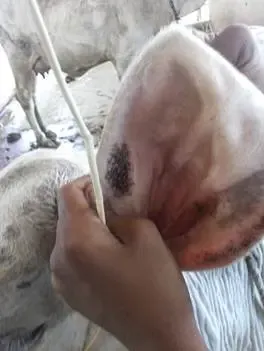Have Traditional Therapies Been Standardised to Enhance Livestock Health?

Synopsis
Key Takeaways
- Standardisation of three traditional therapies for livestock health.
- Focus on sustainable and affordable solutions.
- Supports women farmers in the dairy sector.
- Addresses critical issues like tick infestations and nutritional deficiencies.
- Integrates indigenous knowledge into formal veterinary systems.
New Delhi, Nov 19 (NationPress) The Ministry of Science and Technology announced on Wednesday that technical expertise on three distinctive traditional therapies has been standardised to enhance livestock treatment.
With the rising demand for livestock products, it is vital to ensure food security, safety, and quality. The dairy industry, predominantly supported by women farmers, encounters persistent issues such as tick infestations, retained placenta, and nutritional deficiencies, which diminish productivity and revenue.
To tackle these concerns, the National Innovation Foundation-India (NIF), an autonomous body under the Department of Science and Technology (DST), has developed innovative solutions by pinpointing new herbal methods that cater to industrial needs through product refinement. These solutions provide sustainable and cost-effective options for livestock health and rural economies.
The Ministry stated, “India's rich biodiversity-based wisdom, particularly in indigenous livestock healthcare, presents sustainable alternatives to chemical and antibiotic treatments.”
“The NIF has acknowledged, disseminated, and maintained technologies for managing ectoparasite infestations, enhancing milk production potential (Galactogogue properties), and preventing/treating retained placental conditions in dairy animals by exceptional traditional knowledge holders from Odisha and Bihar,” it added.
The Ministry also indicated that the minimum dosage and cost have been standardised, efficacy has been improved, and safety has been guaranteed.
NIF is focused on validating and integrating these practices into the formal veterinary framework and promoting the development of herbal, eco-friendly therapies. To commercialise these unique herbal products, NIF has entered into a technology licensing agreement with Rakesh Health Care India, a pharmaceutical company based in Gujarat.
“It is widely recognised that cost-effective, sustainable technologies are increasingly sought after due to notable single-drug related limitations, such as resistance development and drug residues. Indigenous remedies can fulfil these needs and effectively address environmental challenges,” the Ministry stated.
“Indigenous knowledge systems can bridge therapeutic gaps and enhance the development of sustainable, affordable medicinal products while reducing potential health risks,” it concluded.









